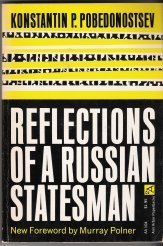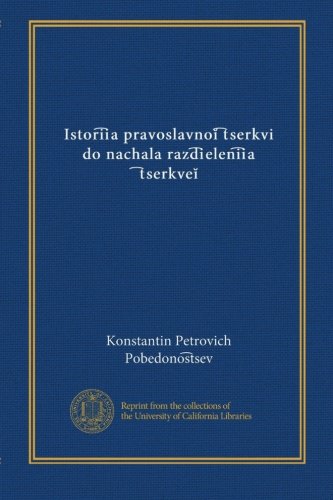Background
Constantine Petrovich Pobedonostsev was born in Moscow, Russia on may 21, 1827.



( This work has been selected by scholars as being cultur...)
This work has been selected by scholars as being culturally important, and is part of the knowledge base of civilization as we know it. This work was reproduced from the original artifact, and remains as true to the original work as possible. Therefore, you will see the original copyright references, library stamps (as most of these works have been housed in our most important libraries around the world), and other notations in the work. This work is in the public domain in the United States of America, and possibly other nations. Within the United States, you may freely copy and distribute this work, as no entity (individual or corporate) has a copyright on the body of the work. As a reproduction of a historical artifact, this work may contain missing or blurred pages, poor pictures, errant marks, etc. Scholars believe, and we concur, that this work is important enough to be preserved, reproduced, and made generally available to the public. We appreciate your support of the preservation process, and thank you for being an important part of keeping this knowledge alive and relevant.
http://www.amazon.com/gp/product/0472061046/?tag=2022091-20

(This book was digitized and reprinted from the collection...)
This book was digitized and reprinted from the collections of the University of California Libraries. It was produced from digital images created through the libraries mass digitization efforts. The digital images were cleaned and prepared for printing through automated processes. Despite the cleaning process, occasional flaws may still be present that were part of the original work itself, or introduced during digitization. This book and hundreds of thousands of others can be found online in the HathiTrust Digital Library at www.hathitrust.org.
http://www.amazon.com/gp/product/B009XUHJJI/?tag=2022091-20
jurist politician statesman writer
Constantine Petrovich Pobedonostsev was born in Moscow, Russia on may 21, 1827.
He studied at the School of Law in St Petersburg.
He entered the public service as an official in one of the Moscow departments of the senate.
From 1860 to 1865 he was professor of Russian civil law in the Moscow University, and instructed the sons of Alexander II in the theory of law and administration.
In 1868 he became a senator in St Petersburg, in 1872 a member of the council of the empire, and in 1880 chief procurator of the Holy Synod.
In the early years of the reign of Alexander II (1855 - 1881), Pobedonostsev maintained, though keeping aloof from the Slavophils, that Occidental institutions were radically bad in themselves and totally inapplicable to Russia. Parliamentary methods of administration, modern judicial organization and procedure, trial by jury, freedom of the press, secular education - these were among the principal objects of his aversion. He subjected all of them to a severe analysis in his Reflections of a Russian Statesman. To these dangerous products of Occidental rationalism he found a counterpoise in popular vis inertiae, and in the respect of the masses for institutions developed slowly and automatically during the past centuries of national life. Among the practical deductions drawn from these premisses is the necessity of preserving the autocratic power, and of fostering among the people the traditional veneration for the ritual of the national Church.
After the death of Alexander III he lost much of his influence, for Nicholas II, while clinging to his father's Russification policy and even extending it to Finland, disliked the idea of systematic religious persecution, and was not wholly averse from the partial emancipation of the Russian Church from civil control. During the revolutionary tumult which followed the disastrous war with Japan Pobedonostsev, being nearly 80 years of age, retired from public affairs.
( This work has been selected by scholars as being cultur...)
(This book was digitized and reprinted from the collection...)
He sought to defend Russia and the Russian Orthodox church against all rival religious groups, such as the Old Believers, Baptists, Catholics, and Jews.
He always showed himself an uncompromising Conservative, and never shrank from expressing boldly his opinions. Consequently, in the so-called Liberal camp he was always denounced an an "obscurantist" and an enemy of progress.
In the sphere of practical politics he exercised considerable influence by inspiring and encouraging the Russification policy of Alexander III (1881-1894), which found expression in an administrative Nationalist propaganda and led to a good deal of religious persecution.
